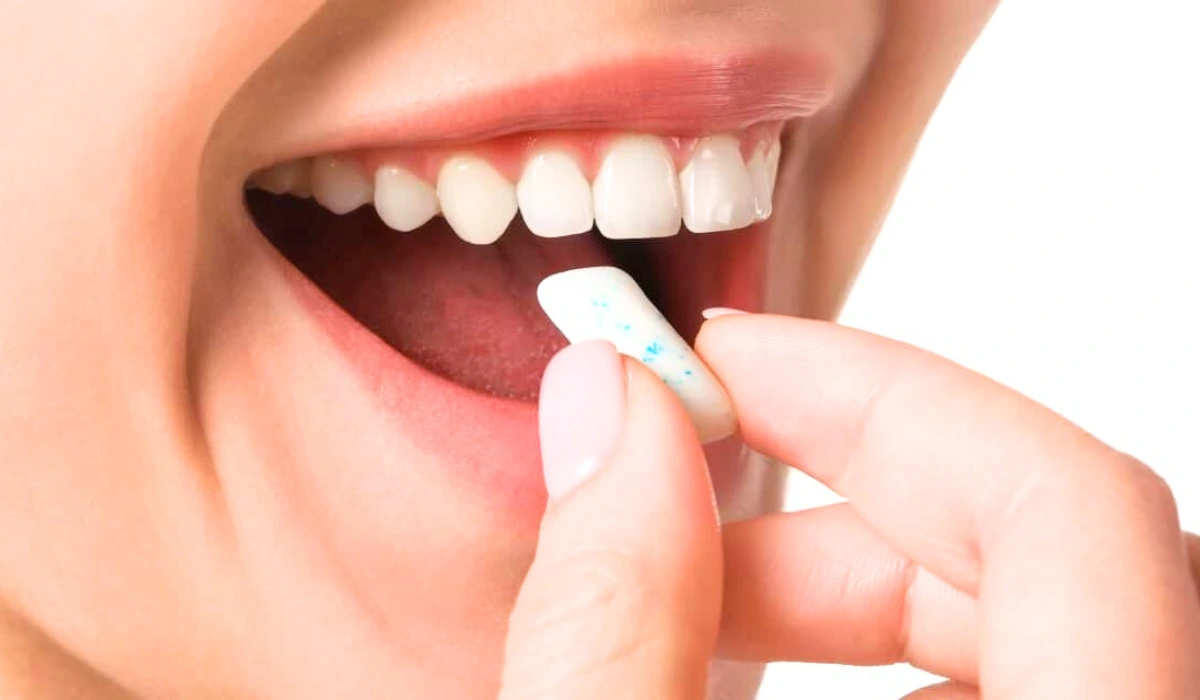Are there any benefits that can be gained from chewing sugar-free gum? Well yes! Indeed, it can be beneficial in several ways for the health of the teeth and the entire mouth. We tell you about these benefits you can derive some health benefits from sugar-free gum.
Chewing gum regularly stimulates salivation and releases antibacterial sweeteners, both of which help inhibit cavity-causing bacteria.
Why chew sugar-free gum?

When you chew sugar-free gum, it reproduces the action of chewing, like when you eat. When chewing, the salivary gland becomes activated, and saliva production in the oral environment increases. This process is important because saliva mixes with food, allowing us to swallow it. Saliva helps break down food, which is the first step in digestion.
So, when you chew sugar-free gum, it helps maintain a sufficient level of saliva in the mouth. This has concrete effects on oral health, since saliva.
Naturally cleansed teeth, partially eliminating food residues as well as the bacteria that feed on them. Saliva therefore limits bacterial proliferation.
Balances the pH, or acidity level, inside the mouth. Saliva effectively neutralizes the acid produced by the bacteria in the mouth. It therefore helps prevent cavities, as well as the erosion of enamel which occurs when the oral environment is very acidic.
False sugar beneficial for oral health
Next, you should know that sugar-free gum, as its name suggests, does not contain added sugar. This should of course prove to be damaging to the teeth, by promoting the development of cavities.
Sugar-free gum instead contains sweeteners, such as xylitol and sorbitol. They are added to give a pleasant taste to the sugar free gum. Well, you should know that this sweeteners have an antibacterial action.
Bacteria in the mouth perceive them as real sugars. They will then metabolize them. As a result, they lose their ability to metabolize real sugars that come from food and attach to dental surfaces. The metabolization of sweeteners by bacteria causes them to lose their ability to multiply and produce acids that are harmful to teeth.
When it comes to chewing gum and its benefits for oral health:
- Always choose a sugar-free gum that contains xylitol or sorbitol
- Chew gum after meals to help clean the mouth of food residue and neutralize some of the bacteria that feed on it
- Chewing gum does not replace your hygiene routine. Make sure to brush your teeth about 30 minutes after meal and snacks
- The next time you pass the chewing gum display at the convenience store or grocery store, grab a pack of sugar-free gum to chew on after your meals. The health of your smile we only benefit from it.
Also Read: 10 Best Mouthwashes For Bad Breath For Healthy Gums
Sugar-free chewing gum is better or not?
Synthetic or mass sweeteners can help as the sweetening power is higher, the calories are reduced and the effects on blood sugar are moderate or zero, which is interesting, for example for diabetics. However, they can have side effects like gastrointestinal upset and fuel sugar cravings.
What about oral health? Chewing sugar-free gum can have beneficial effects on oral health, by reducing the demineralization of enamel, reducing the incidence of cavities, neutralizing the acidity of dental plaque, and reducing dental plaque. This also helps fight against dry mouth (aka xerostomia). This quality is mainly linked to the increased flow of saliva and requires a certain regularity. Chew 3 times per day, for 20 minutes, after meals. These qualities of chewing gum are particularly effective with the presence of fluorides or xylitol in chewing gum.
Why do many try to control their urge to smoke or eat by chewing gum, an article published in the British Medical Journal (BMJ) reports cases of significant side effects from sugar-free gum due to sweetener sorbitol, which it contains. Sorbitol can cause significant diarrhea and a significant drop in weight associated with nutritional deficits. Sorbitol, or sweeteners (sugar substitute), impair the absorption capacity of the intestines and have a laxative effect.
Gastroenterologists from the University of Berlin reported two cases of intestinal disorders and weight loss linked to sorbitol: A 21-year-old woman suffering from severe abdominal pain for 8 months who had lost 11 kg and a 46-year-old man who had lost 22 kg in 1 year, or a fifth of his weight.
After this people underwent a range of tests that did not confirm the initial diagnostic hypotheses, and examination of their diet revealed that they consumed daily chewing gum containing the equivalent of approximately 20 g of sorbitol ( one chewing gum contains 1.25 ) stopping this consumption quickly stopped the symptoms.
Only a minority of people who chew gum developed this problem. But in the case of unexplained weight loss, this hypothesis should be verified, the researchers conclude. Even in relatively small doses (between 5 and 20 g) sorbitol can cause symptoms such as abdominal swelling and cramping.
Other related effects of gum chewing
Chewing gum could cause migraines
According to a study published in January 2014 in the journal Pediatric Neurology, chewing gum regularly and for a long time could be the cause of migraines that some adolescents and children suffer from. The study concludes that overuse of the temporomandibular joints, which is used during chewing movements, is undoubtedly the triggering mechanism for headaches concentration, mood, etc.
According to university studies carried out in collaboration with Wrigley and Cadbury, the two main manufacturers of chewing gum, chewing gum improves concentration, alertness, memory, and mood and reduces stress and anxiety. It is important to remain critical of the impartiality of these studies when they are conducted by the product manufacturers. However, we observe that independence studies have arrived at a similar result.
Conclusion
Finally, chewing gum causes significant saliva production. When it is swallowed at the same time as air, it is likely to cause digestive problems such as bloating or flatulence. Therefore, in light of these studies, we see that, if sugar-free chewing gum is consumed sparingly, it makes it possible to maintain good oral hygiene without causing adverse effects on health. Chewing gum is therefore no exception to the rule that moderation tastes much better.

